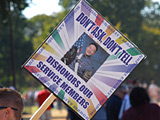Costs of War: The Sexual Orientation of Defense
By Shaun Waterman for ISN
A external pagenew survey of 3,000 active-duty troopscall_made found opposition to gay men and women serving openly has fallen from nearly two-thirds, or 65 percent, in 2004 to just over half, 51 percent, today. But the survey, published Monday by the Military Times group, also found less than a third of active-duty personnel, 30 percent, favored allowing gays and lesbians to serve openly.
The survey comes less than a week after Chairman of the Joint Chiefs of Staff Admiral external pageMichael Mullen told a Senate hearingcall_made “my personal belief is that allowing gays and lesbians to serve openly would be the right thing to do.”
The political winds
Since 1993, when then-president Bill Clinton’s effort to end a total ban on gays and lesbians in the military was derailed by Congress, a external pagelegislative compromisecall_made has made homosexual conduct grounds for discharge, but also stipulated that military personnel would not be asked about their sexual orientation - a policy known as ‘don’t ask, don’t tell.”
Colin Powell, the retired four-star general and former secretary of state, external pagecame outcall_made (forgive the pun) in favor of lifting the ban last week, after Mullen’s testimony.
"In the almost seventeen years since the 'don't ask, don't tell' legislation was passed, attitudes and circumstances have changed," Powell said in a statement released by his office.
Powell can always be counted on to take a principled stance - if the prevailing political wind is in the right direction and it will not hurt his career prospects - but his about face on this issue is particularly noteworthy.
In 1993, it was his opposition, when he held the job Mullen has now as chairman of the Joint Chiefs of Staff, that was external pagecrucial to scuppering Clinton’s effortcall_made to overturn the ban on gays in the military completely.
Mullen’s stance will make it harder for opponents to argue - as they did in 1993 - that changing the policy will hurt the military.
“No matter how I look at this issue,” Mullen told senators last week, “I cannot escape being troubled by the fact that we have in place a policy which forces young men and women to lie about who they are in order to defend their fellow citizens. For me personally it comes down to integrity - theirs as individuals, and ours as an institution.”
Mullen’s views appear to be shared by the majority of Americans. In a external pageGallup poll last yearcall_made, 69 percent supported allowing gays and lesbians to serve openly in the military, while just 26 percent opposed it. Gallup said that represented a 6 percent shift in favor of open service since their previous polling in 2004.
But opposition has always run deeper in the military than in the population at large. Even today, the external pageMilitary Times datacall_made suggests that those opposed to repealing the policy feel more strongly about the issue than those who support it.
Of the 51 percent who opposed allowing gay men or women to serve openly, nearly 37 percent were ‘strongly opposed.’ Of the 30 percent who favored it, only 15 percent were ‘strongly’ in favor.
Just over 2 percent external pagetold the Military Times researcherscall_made they were themselves gay or bisexual, and nearly 3 percent refused to answer the question.
But given the chaos that opponents of repeal say will be precipitated if the ban is lifted, there is a more significant finding. Over half, 57 percent, of troops said they believed there were already gay men or women serving in their own unit.
Mullen told senators: “I have served with homosexuals since 1968 […]. Everybody in the military has, and we understand that.”
Expensive discrimination
Indeed, the evidence seems to point the other way - suggesting that it is the current policy, not its looming repeal, which is impairing military readiness.
In 2005, US external pagegovernment accountants estimatedcall_made that the military had spent $200 million training and recruiting replacements for those who were discharged because of the policy. And 13,500 service members - many of them with rare, hard to replace skills - have been discharged under the policy, external pageaccording to the Servicemembers Legal Defense Networkcall_made.
Over the weekend, one logistics specialist who was discharged in 2008 because of his homosexuality external pagewrote aboutcall_made how he had been back on the frontline within weeks - as a military contractor, doing the same work he had in uniform.
But wasteful and counterproductive as it may be, ‘don’t ask, don’t tell’ will be hard to get rid of. Defense Secretary Robert Gates told the same Senate hearing that a working group developing a plan to end the policy would not report back until the end of the year. And as Republican Senator John McCain was quick to remind him, the final decision about the law lies with Congress.
Republicans have made it clear that they regard national security as one of the Obama administration’s political weak spots - and opposing open service is a twofer: It also fires up the party’s conservative base on family-values issues. This will be a long, tough fight.

